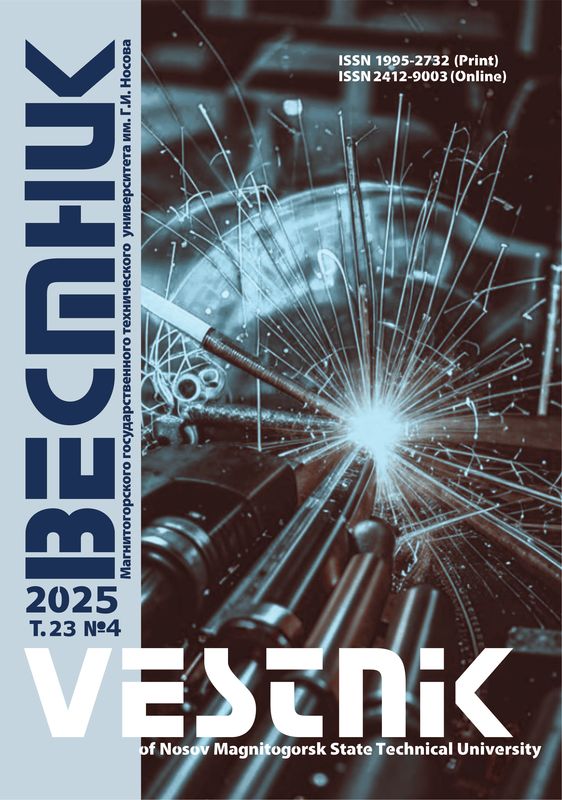DOI: 10.18503/1995-2732-2025-23-2-158-165
Abstract
Problem Statement (Relevance). A feature of the quality management systems (QMS) process is the necessity to consider them from two points of view. One is the content of conversion realized in this process while the other is its compliance with ISO 9000 standards requirements. Therefore, QMS process can be studied at different levels: level of the production flow element (i.e. equipment), production flow level, level of the production flow management and level of production flows network. In order to QMS process digital twin to successfully increase process efficiency on each level by developing improvements its digital model need to comprise elements which correspond to the level of consideration. Objective and Methods Applied. The main objective of this paper is to develop such an approach to QMS process modelling that allows creation of models which elements correspond to the real process elements. This allows to match changes in the process model to those of the real process. System dynamics approach is being used to develop models which structure and behaviour are adequate to the real process. Results. The authors considered an issue of the model of production flow element (equipment) development. The production flow digital model adequate to production systems basic patterns is developed. This model became a basis for the development of the model of production flow management. Practical Relevance. An approach to the development of manufacturing process models is suggested that establishes specific requirements for the simulation models depending on the process improvement concept.
Keywords
process digital twin, imitation modelling, manufacturing process, QMS process, QMS process improvement, model of process improvement, manufacturing processes modelling
For citation
Zaporozhtsev A.V., Khazova Ver.I., Khazova Vik.I. Modelling Based Improvement of QMS Manufacturing Processes. Vestnik Magnitogorskogo Gosudarstvennogo Tekhnicheskogo Universiteta im. G.I. Nosova [Vestnik of Nosov Magnitogorsk State Technical University]. 2025, vol. 23, no. 2, pp. 158-165. https://doi.org/10.18503/1995-2732-2025-23-2-158-165
1. Keddis N., Kainz G., Buckl C., Knoll A. Towards adaptable manufacturing systems. 2013 IEEE International Conference on Industrial Technology (ICIT). Cape Town, South Africa. 2013, pp. 1410-1415. DOI: 10.1109/ICIT.2013.6505878
2. Florescu, A. and Barabas, S. Modeling and Simulation of a Flexible Manufacturing System – A Basic Component of Industry 4.0. Applied Sciences. 2020;10:Article 8300. DOI: 10.3390/app10228300
3. Chen, B., Wan, J., Shu, L., Li, P., Mukherjee, M., & Yin, B. Smart Factory of Industry 4.0: Key Technologies, Application Case, and Challenges. IEEE Access. 2018;(6):6505-6519. DOI: 10.1109/ACCESS.2017.2783682
4. Kelton W. David, Law Averill M. Imitatsionnoe modelirovanie [Simulation Modeling]. Saint-Petersburg: Kyiv: Publishing Group BHV, 2004, 847 p. (In Russ.)
5. Forrester J.W. Osnovy kibernetiki predpriyatiya (Industrialnaya dinamika) [Foundations of enterprise cybernetics (Industrial dynamics)]. Moscow: Publishing House Progress, 1971, 340 p. (In Russ.)
6. Al-Ahmari, A.M., & Ridgway, K. An integrated modelling method to support manufacturing systems analysis and design. Computers in Industry. 1999;(38):225-238. DOI: 10.1016/S0166-3615(98)00094-3
7. State Standard GOST R ISO 9000-2015. Quality Management Systems. Fundamentals and vocabulary. Moscow: Standardinform, 2018, 53 p. (In Russ.)
8. Marca David A., McGowan Clement L. Metodologiya strukturnogo analiza i proektirovaniya SADT [Structured Analysis and Design Technique SADT]. Moscow: MetaTechnology, 1993, 240 p. (In Russ.)
9. Hopp, W.J., & Spearman, M. The lenses of lean: Visioning the science and practice of efficiency. Journal of Operations Management. 2020;(67):610-626. DOI:10.1002/joom.1115
10. Hopp W.J., Spearman M.L. Factory Physics: foundations of Manufacturing Management. New York: Irwin/McGraw-Hill, 2001, 720 p.
11. State Standard GOST R ISO 22400-2-2019. Automation systems and integration – Key performance indicators (KPIs) for manufacturing operations management. Part 2: Definitions and descriptions. Moscow: Standardinform, 2019, 66 p. (In Russ.)
12. Richmond Barry. An Introduction to System Thinking with STELLA. ISEE Systems, inc., 2004, 165 p.
13. Pound E. S., Bell J.H., Spearman M.L. Factory Physics for Managers: How Leaders Improve Performance in a Post–Lean Six Sigma World. New York: McGraw-Hill Education, 2014, 384 p.












